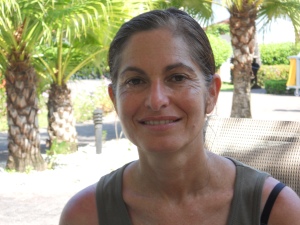by Madeline Kiser
The papers are full of news about water, our waning Colorado River, life-blood source for western states, and it’s hard to tell, reading, what our options are amidst the complex data.
We know that the river is over-allocated, even without climate change.
We know that it’s likely that a shortage on the river, which supplies 35-40 million people, seven states, and much of our agriculture in the U.S., will likely be declared in the next few years, or even months.
We know that it’s likely that to meet the shortage, conservation efforts will be intensified; water will be transferred from farms to cities; we will treat water to potable levels; we will look to desalination, cloud seeding and other technological options.
There’s a lot we don’t know, though. We don’t know who, specifically, in Arizona and in the West, is deciding our water future—which agencies and people, and how they overlap. We don’t know where steady, intensive funding streams for changes we need to make will come from in an era as dry financially as it is hydrologically. We don’t know if we’re doing all we can for ourselves and compared to other areas of the world that are facing situations similar to our own with principles codified into laws and institutions that vary greatly from ours. Around the world monumental change in how water is managed is taking shape, defined by the understanding that nature and people have the first right to water.
We don’t know if the entire way we manage water—our management framework—is as sound and just as it could be, in a time of profound environmental, social and economic change.
In a true water democracy, asking and answering these questions becomes a shared process, involving everyone. Though difficult to implement and facing many challenges, some of the world’s best water laws were written in South Africa during Nelson Mandela’s tenure. They allocate the right to water first to the environment (this, because if you kill the goose that lays the golden eggs, you don’t get the eggs—the environment produces water) and to people, in what is called the Reserve. This amounts to a reversal of how water rights have functioned in much of the world, including in our state.
In order to create a transparent, inclusive conversation about our water future in Arizona, we need, first, to equitably engage citizens in water debates, much as Casa Maria and the Tucson Bus Riders Union have in the area of transportation. Perhaps we need some sort of a state-wide citizens’ advisory board, as the time for calling a shortage on the Colorado approaches, or a less formal entity and process for publicly questioning what we are choosing in the context of global best practices for managing water. These are shifting from de facto investing in expensive high-tech options, such as desalination, without significantly increasing conservation measures (Australia uses about half of the water we do) and employing other options, such as water transfers and trading.
It perhaps isn’t coincidental that South Africa has helped re-frame the way the world thinks about water. Water experts there involved in helping make this shift from what is a more individualistic, consumptive model of using and allocating water to one based on principles of equity and stewardship speak of having lived through and been shaped by the transition from apartheid, absorbing the experience of non-violent action. Their science is permeated by this lived experience.
I don’t believe one sector or sectors deserve the blame entirely for this moment we find ourselves in, water being wasted, great inequality, silence from those who must have a voice, our future imperiled if we don’t shift from consumption and isolation, to–as Pope Francis says–joyful solidarity. (Poverty, after all, is also poverty of the spirit, and a narrative of individualism and consumption seeps into each one of us, creating fear.)
I believe we must step beyond our fear and our shared ignorance of the precariousness of this moment, with a drying planet, a waning river here in our U.S. West, into that difficult, necessary space of risking all to question and engage, to love fully and fearlessly, shaping a true water democracy.
____________________________________________________________________
Los periodicos están llenos de noticias acerca del agua, nuestro menguante rio colorado, recurso de sangre viva para los estados del oeste, y es difícil decir por escrito, cuales son nuestras opciones enmedio de tan complejos datos.
Sabemos que el rio esta sobre esignado an sin cambios de clima.
Sabemos que problamente un “recorte” en el rio, el cual suministra de 35 a 40 millones de personas, en 7 estados y much de nuestra agricultura en la nación sera probablemente declarado en únos cuantos anos o tal vez meses.
Sabemos que tal vez nos enfrentemos a los recortes, y esfuerzos de conservación serán intensificados, el agua sera transferida de las granjas a las ciudades; trataremos de mejorar su potabilidad y mirando a la des alinizdeion y la exitacion de nubes y otras opciones technológicas.
Hay much de lo que no sabemos. No sabemos quien especificamente en Arizona y el Oeste, está decidiendo por el futuro de nuestra agua. Lo cual agencias y personas de alguna certidumbre, necesitamos una intensiva corriente de cambios que vendra como resultado en una era de resequedad financiera tanto como Hidrológica. No sabemos se estamos haciendo todo lo que podemos por nuestros mismos, y comparado con otras partes del mundo, que están enfrentando situaciones similares a la nuestra, con nuevos codigos aplicados a las leyes e instituciones que varian grandemente de las nuestras.
Arrededor del mundo un monumental cambio en como manejar el agua está tomando brillo manejar.
Defimendo por la naturaleza del entendimento de que las personas tienen derecho al aqua.
No sabemos si nuestro absoluto manejo del agua – nuestra estructura de manejo, suena como bebería ser, en un tiempo de profundos cambios ambientales, sociales y económicos.
En una verdadera democracia del agua. preguntar y responder a estas preguntas se convierte en un proceso compartido involucrándonos a todos. Altravez de la dificultad para implementar y enfrentar muchos desafíos.
Algunas de las mejores leyes hidráulicas en el mundo fueron escritas en sudáfrica durante la tenencia de Nelson Mandela. Ellos asignaron el derecho al agua primero al medio ambiente (esto es per que si matas a la ganza de los huevos de oro te quedas sin los huevos) (el medio ambiente produce agua) y para la gente.
(Australia usa casi la mitad del agua que nosotros) y empleando otras opciones como intercambio y tranferencia del agua.
No es ninguna coincidencia que sudáfrica a ayudado a reformar la maner en que el mundo piensa con respecto al agua.
Los ahí involucrados expertos del agua ayudando en estos cambio desde; cuales el mas individualista modelo de consumo a llevar a cabo asignamdo agua al individuo basado en principios de igualdad administrativa, hablar de tener vivido trayecto conformado por la transición desde la segregación. Absorbiendo la experiencia de las acciones no violentas. Su ciencia es permitida por esta experiencia viva.
No creo que uno o varrias sectores deban segarse por competo debido al momento, en que nos encontramos por nosotros mismos, agua, gran desigualdad, en el silencio de aquellos que deberían tener voz.
Se no cambiamos del consumismo y aislamiento a como nos dice el papa Francisco “gozoso en solidaridad” (Pobreza ante todo, es tambien pobreza de espíritu, y una narrativa de individualismo de consumo se filtra a cada uno de nosotros, creando miedo.
Creo que devemos avanzar mas alla de nuestros miedos e ignorancia compartida de la precariedad del momento con un planeta en resequedad. Con un decadente rio aquí en el oeste de nuestra Union Americana. Rumbo a lo difícil, es necesario abrir espacio de arriesgarnos a cuestionar y relacionar, para amar por completo sin miedo, conformando una verdadera democracia Hidráulica.

